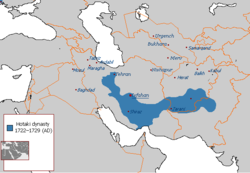Hotaki Empire
| Hotak Empire | ||||||||||||
|
||||||||||||
|
Flag
|
||||||||||||
|
Hotak Empire at its peak (1722–1729)
|
||||||||||||
| Capital |
Kandahar Isfahan |
|||||||||||
| Languages |
Pashto Persian |
|||||||||||
| Religion | Sunni Islam | |||||||||||
| Government | Absolute monarchy | |||||||||||
| Emir | ||||||||||||
| • | 1709–1715 | Mirwais Hotak | ||||||||||
| • | 1715–1717 | Abdul Aziz Hotak | ||||||||||
| • | 1717–1725 | Mahmud Hotak | ||||||||||
| • | 1725–1730 | Ashraf Hotak | ||||||||||
| • | 1725–1738 | Hussain Hotak | ||||||||||
| Historical era | Early modern period | |||||||||||
| • | Revolt by Mirwais Hotak | April 1709 | ||||||||||
| • | Siege of Kandahar | 24 March 1738 | ||||||||||
|
||||||||||||
| Today part of |
|
|||||||||||
The Hotak dynasty or the Hotaki dynasty was an Afghan monarchy of the Ghilji Pashtuns, established in April 1709 by Mirwais Hotak after leading a successful revolution against their declining Persian Safavid overlords in Kandahar. It lasted until 1738 when the founder of the Afsharid dynasty, Nader Shah Afshar, defeated Hussain Hotak during the long siege of Kandahar, and started the reestablishment of Iranian suzerainty over all regions lost decades before against the Iranian archrival, the Ottomans, and the Russians. At its peak, the Hotak dynasty ruled very briefly over an area which is now Afghanistan, western Pakistan, and large parts of Iran.
In 1715, Mirwais died of a natural cause and his brother Abdul Aziz succeeded the monarchy. He was quickly followed by Mahmud who ruled the empire at its largest extent for a mere three years. Following the 1729 Battle of Damghan, where Ashraf Hotak was roundly defeated by Nader Shah, Ashraf was banished to what is now southern Afghanistan with Hotak rule being confined to it. Hussain Hotak became the last ruler until he was also defeated in 1738.
Kandahar province was ruled by the Shi'a Safavids as their far easternmost territory from the 16th century until the early 18th century, while the native Afghan tribes living in the area were Sunni Muslims. Immediately to the east began the Sunni Mughul Empire, who occasionally fought wars with the powerful Safavids over the territory of southern Afghanistan. The area to the north, was controlled by the Khanate of Bukhara at the same time.
...
Wikipedia


